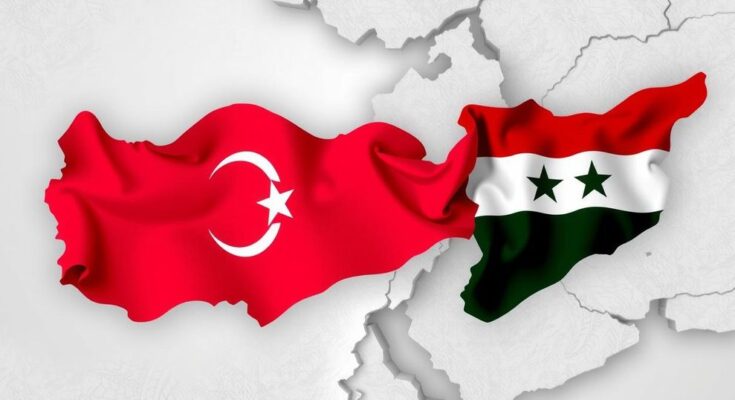Turkey is seeking support from Saudi Arabia and the UAE for Syria’s stabilization following the regime’s collapse. The Turkish government is cautious, aiming for a neutral governance structure while ensuring the interests of regional powers are respected. Additionally, Turkey is navigating complex geopolitical dynamics involving Russia and the EU for reconstruction cooperation.
Turkey is proactively seeking the backing of Saudi Arabia and the United Arab Emirates (UAE) to facilitate the stabilization and reconstruction of Syria following the unexpected collapse of Bashar al-Assad’s regime. As Turkey emerges as a crucial player in the evolving situation, officials in Ankara exhibit caution, determined to avoid the pitfalls experienced during the Arab Spring. Turkish President Recep Tayyip Erdogan is particularly interested in securing the support of Gulf nations, which have expressed skepticism towards Islamism. He acknowledges the importance of listening to the apprehensions voiced by Saudi Arabia and the UAE regarding the future trajectory of Syria.
During an upcoming summit in Cairo, President Erdogan intends to collaborate with Egyptian President Abdel Fattah el-Sisi, who shares similar concerns about the implications of the heightened influence of Hay’at Tahrir al-Sham (HTS) in Syria. Although Turkey has traditionally distanced itself from overt support for HTS, which has historical ties to al-Qaeda, Turkish Foreign Minister Hakan Fidan stated, “No one knows this group better than Turkey,” indicating an acknowledgment of Turkey’s nuanced role in the complexities of Syrian governance and regional security.
The Turkish government is emphasizing the necessity of a neutral Syria that does not pose a threat to neighboring countries, including Israel and Iran. In a recent statement, Minister Fidan articulated Turkey’s stance on geopolitical balance, stating, “We do not want Iranian domination in the region, nor do we want Turkish domination.” Ankara is advocating for cooperation among regional powers to foster stability, underscoring that a united front is vital to thwart external interventions that could exacerbate existing conflicts.
Turkey’s diplomatic overtures toward the UAE have seemingly influenced Gulf leaders’ perspectives, with recent indications of a willingness to engage constructively in Syria’s economic future. However, Turkey understands that Gulf funding will be essential for any reconstruction efforts, and anticipates collaboration from Western powers, particularly the European Union, which has signaled interest in early recovery initiatives.
Nonetheless, the presence of Russia, a long-time ally of Assad, poses a significant challenge. Some EU member states are calling for Russian withdrawal as a condition for their involvement, thereby complicating Turkey’s efforts to stabilize Syria. Ankara is hopeful that increased engagement will lead to mutual recognition and cooperation among key players, including Russia and Iran, to expedite recovery and normalization in the region.
The article discusses Turkey’s strategic efforts to stabilize Syria post-Assad regime collapse, emphasizing the importance of regional cooperation with Gulf nations and addressing geopolitical concerns. It highlights Turkey’s commitment to avoiding past mistakes from the Arab Spring while seeking to establish a neutral Syrian governance structure. There are also implications for external influences, particularly regarding Russian military presence and the roles of Gulf countries in Syria’s reconstruction.
In conclusion, Turkey’s approach towards seeking collaboration from the UAE and Saudi Arabia signals a notable shift in regional dynamics. By advocating for a neutral, non-threatening Syria, Turkey aims to ensure long-term stability while preventing domination by any single power. The complexities of geopolitical interplay, particularly involving Russia and Western nations, remain critical to Syria’s future, as reconstruction efforts and diplomatic relations evolve. Turkey’s proactive engagement with its regional allies will be essential in shaping a balanced and cooperative framework for Syria’s recovery.
Original Source: www.middleeasteye.net




